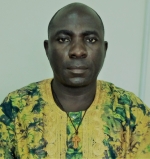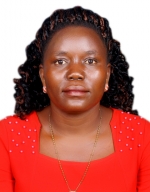RUTH NAKATO
ID:
|
A model for assessing the Banking Sector Employees’ Ethical Behavior towards Cyber security.
REFNo: SIR34ES
1. To examine the extent to which cardinal virtue constructs can influence the cyber security behavioral intention of employees towards cyber security ethical behavior in commercial banks in Uganda.
2. To analyze the moderation effect of ethical climate on the virtue constructs in connection with the behavioral intention of employees towards cyber security ethical behavior in commercial banks in Uganda.
3. To examine the mediation effect of behavior intention on the influence of virtue ethics towards cyber security ethical behavior in commercial banks in Uganda.
4. To develop a model for assessing the Employees’ Ethical Commitment and Behavior towards Cyber security in commercial banks in Uganda.
5. To test and validate the developed model.
|
Uganda |
2021-02-08 |
2024-02-08 |
Engineering and Technology |
|
Degree Award |
.JPG)
|
Tadele Yadesa Mekuriya
ID: UNCST-2022-R010338
|
Incidence, predictors and risk prediction of adverse drug reactions among inpatients 60 years and older at Mbarara Regional Referral Hospital, Mbarara, Uganda
REFNo: HS992ES
1. To determine the incidence and prevalence of ADRs among elderly inpatients at MRRH
2. To characterize (types, severity and preventability) the ADRs detected among elderly inpatients at MRRH
3. To determine the risk factors of ADRs among elderly inpatients at MRRH
4. To develop and validate an ADR risk score tool (to be named as PADR-HE) for elderly inpatients at MRRH
|
Ethiopia |
2021-02-08 |
2024-02-08 |
Medical and Health Sciences |
|
Degree Award |
.jpg)
|
Angua Amis Mao
ID:
|
Energy access as a dividend for designing just transition pathways (EAJT)
REFNo: SIR48ES
1. To assess the effectiveness of different renewable energy technologies in accelerating green jobs creation and a low carbon trajectory;
2. To analyse the equity and distributional implications of energy transition in vulnerable communities across gender, age, and income groups;
3. To develop potential financial and business models to deliver a just transition pathway; and
4. To explore appropriate policy and regulatory frameworks required to support a just transition at multiple levels from grassroots to the national and regional level.
|
Uganda |
2021-02-08 |
2024-02-08 |
Engineering and Technology |
|
Non-degree Award |

|
David Musoke
ID:
|
Distribution of antibiotic profiles and antibiotic resistance associated with tuberculosis treatment regimens from wastewater treatment plants in Africa
REFNo: HS1017ES
Specific objectives
1. To determine the profile and concentration of antibiotics used in TB treatment in raw and treated sewage.
2. To investigate the efficiency of the WWTP treatment process in relation to removal of antibiotics post chlorination.
3. To determine the prevalence of antibiotic resistant bacteria (ARB) in raw and treated wastewater in these WWTPs.
4. To evaluate the prevalence of antibiotic resistance genes (ARGs) in raw and treated wastewater.
|
Uganda |
2021-02-08 |
2024-02-08 |
Medical and Health Sciences |
|
Non-degree Award |

|
Francis Ssali
ID: UNCST-2021-R012134
|
An open-label, roll-over study with rilpivirine in combination with a background regimen containing other antiretrovirals (ARVs) in human immunodeficiency virus type 1 (HIV-1) infected subjects who participated in rilpivirine pediatric studies
REFNo: HS1083ES
In view of the primary objective of the study to provide continued access to RPV, no primary endpoint is defined for this study.Secondary Endpoint
The secondary endpoints are applicable for all subjects until data collection is terminated, as indicated.
Major Secondary Endpoints
The proportion of subjects experiencing adverse events (AEs) considered to be at least possibly related to RPV, AEs leading to discontinuation, serious adverse events (SAEs), pregnancies, and grade 3/4 rash regardless of causality throughout the study. Results of routine safety laboratory tests will only be collected if related to these types of AEs.
Other Secondary Endpoint
The proportion of subjects maintaining viral suppression (ie, <50 HIV-1 RNA copies/mL) based on available viral load data throughout the study. In case of virologic failure, emergence of resistance will also be evaluated based on available genotype/phenotype data.
|
Uganda |
2021-02-08 |
2024-02-08 |
Medical and Health Sciences |
|
Non-degree Award |

|
Jonathan Mwiindi Thuranira
ID:
|
EMERGENCY CESAREAN SECTION AND LENGTH OF STAY IN HOSPITALS IN UGANDA
REFNo: HS1093ES
1. To determine if payer-type (SAFE vs. self-pay) is associated with the decision to delivery interval (DDI) for rural Uganda women undergoing an emergency C-section in Nyakibale Hospital and Rushoroza Hospital. The DDI is the first phase of the aggregated LOS.
2. To determine if payer-type (SAFE vs. self-pay) is associated with the aggregate LOS for rural Uganda women undergoing an emergency C-section in Nyakibale Hospital and Rushoroza Hospital in rural Uganda while adjusting for the Decision to Delivery Interval (DDI).
3. To describe the experience of eight young mothers (aged 18-25) having their second (or more) C-Section delivered by emergency C-section in Southwest Uganda under the SAFE program during April 2020.
|
Kenya |
2021-02-08 |
2024-02-08 |
Medical and Health Sciences |
|
Degree Award |

|
Bonaventure Ssebyanzi Wasswa
ID:
|
PRIMARY SCHOOL SUPPORT SYSTEMS TO DEAF CHILDREN LEADING TO THEIR TRANSITION TO POST-PRIMARY EDUCATION IN UGANDA
REFNo: SS590ES
(i) To investigate the support systems for deaf children at the completion of primary school studies.
(ii) To examine the situation of deaf children at the completion of primary studies.
(iii) To explore the self of deaf children at the completion of primary studies.
(iv) To establish the strategies for transition to post-primary level of deaf children at the completion of primary studies.
|
Uganda |
2021-02-05 |
2024-02-05 |
Social Science and Humanities |
|
Degree Award |

|
Alex Taremwa Taremwa
ID: UNCST-2020-R014302
|
VIABILITY OF DIGITAL SUBSCRIPTION IN EAST AFRICA – AN ANALYSIS OF VIUSASA AND CHIMPREPORTS’ PAYWALLS
REFNo: SS629ES
1. To identify critical success factors for subscription-based models in digital media platforms.
2. To establish the barriers to subscription uptake among digital media in East Africa.
3. To assess the critical success factors against the ChimpReports and Viusasa’s strategies.
4. To analyse the consumption habits of audiences in line with payment for digital content on Viusasa and Chimp.
|
Uganda |
2021-02-05 |
2024-02-05 |
Social Science and Humanities |
|
Degree Award |

|
Joseph Lutaakome
ID: UNCST-2020-R008323
|
An open-label, roll-over study with rilpivirine in combination with a background regimen containing other antiretrovirals (ARVs) in human immunodeficiency virus type 1 (HIV-1) infected subjects who participated in rilpivirine pediatric studies
REFNo: HS1013ES
Primary Endpoint
The primary objective of the study is to provide continued access to RPV, however there is no primary endpoint defined for this study.
Secondary Endpoint
The secondary endpoints are applicable for all subjects until data collection is terminated, as indicated.
Major Secondary Endpoints
The proportion of subjects experiencing adverse events (AEs) considered to be at least possibly related to RPV, AEs leading to discontinuation, serious adverse events (SAEs), pregnancies, and grade 3/4 rash regardless of causality throughout the study. Results of routine safety laboratory tests will only be collected if related to these types of AEs.
Other Secondary Endpoint
The proportion of subjects maintaining viral suppression (ie, <50 HIV-1 RNA copies/mL) based on available viral load data throughout the study. In case of virologic failure, emergence of resistance will also be evaluated based on available genotype/phenotype data.
|
Uganda |
2021-02-05 |
2024-02-05 |
Medical and Health Sciences |
|
Non-degree Award |

|
Jennifer Serwanga
ID: UNCST-2024-R002056
|
Preparation of an Inactivated covid-19 vaccine at UVRI for pre-clinical evaluations at COVAB and an Outsourced primate centre
REFNo: HS1018ES
Collect nasopharyngeal swab of circulating virus strains
b. Isolate local and globally representative wildtype SARS-CoV2 stocks
c. Generate inactivated SARS-CoV-2 products (The Vaccine).
d. Generate SARS-CoV-2 and other b-CoVs pseudovirus stocks
e. Develop assays to distinguish SARS-CoV-2 binding antibodies
f. Develop assays to distinguish SARS-CoV-2 functional neutralizing antibodies
g. Assess inactivated vaccine in Humanized ACE2 mice challenge models
h. Challenge Macaque models to assess safety, immunogenicity and protectiveness
i. Assess immunized mice for vaccine-induced antibody responses
j. Assess immunized mice for vaccine induced cellular responses
k. Assess immunized mice plasma for inflammatory responses
l. Immuno/histopathology of immunized mice organs/tissues
m. Train and develop capacity for skill transfer
The research questions are;
• Will the inactivated vaccine protect challenged mice against developing COVID-19
disease?
• Will the vaccine elicit potent neutralizing antibodies against diverse SARS-CoV-2
strains and how potent are these antibodies?
• Will the vaccine protect the challenged mice against severe inflammatory responses
and organ pathology?
• Will the inactivated vaccine elicit potent and protective effector T -Cell responses?
|
Uganda |
2021-02-05 |
2024-02-05 |
Medical and Health Sciences |
|
Non-degree Award |

|
Athanansio Bashaija
ID:
|
Occupational Stress, Hope, and Alcohol Use among Secondary School Teachers in Greater Bushenyi, Uganda
REFNo: SS671ES
To examine the level of occupational stress among secondary school teachers in Greater Bushenyi.
To assess the level of alcohol use among secondary school teachers in Greater Bushenyi.
To examine the level of hope among secondary school teachers in Greater Bushenyi.
To determine the relationship between occupational stress and alcohol use among secondary school teachers in Greater Bushenyi.
To establish the moderation effect of hope on the relationship between occupational stress and alcohol use among secondary school teachers in Greater Bushenyi.
|
Uganda |
2021-02-05 |
2024-02-05 |
Social Science and Humanities |
|
Degree Award |

|
Victor Musiime
ID: UNCST-2021-R013794
|
A Phase 2b Study to Evaluate the Safety and Efficacy of IMR-687 in Subjects with Sickle Cell Disease (IMR-SCD-301)
REFNo: HS1119ES
Primary Objectives:
1. To evaluate the HbF response to IMR-687 versus placebo
2. To evaluate the safety of IMR-687 versus placebo
Secondary Efficacy Objectives:
1. To evaluate the effect of IMR-687 versus placebo on HbF-associated biomarkers
2. To evaluate the effect of IMR-687 versus placebo on indices of red cell hemolysis
3. To evaluate the effect of IMR-687 versus placebo on indices of RBC adhesion
4. To evaluate the effect of IMR-687 versus placebo on the incidence of VOCs
5. To evaluate the effect of IMR-687 versus placebo on quality of life (QoL) measures
Pharmacokinetic Objectives:
To evaluate the PK of IMR-687 and any major circulating metabolites
Exploratory Efficacy Objectives:
1. To evaluate the effect of IMR-687 versus placebo on changes in RBC characteristics and total Hb
2. To evaluate the effect of IMR-687 versus placebo on renal function
3. To evaluate the effect of IMR-687 versus placebo on indices associated with cardiovascular pathophysiology and ischemic stroke risk
|
Uganda |
2021-02-05 |
2024-02-05 |
Medical and Health Sciences |
|
Non-degree Award |

|
Sheila Balinda Nina
ID: UNCST-2021-R013804
|
Novel Adenovirus-based Vaccine for Uganda SARS COV-2 viruses
REFNo: HS1153ES
To develop a Novel SARS-Cov-2 Adeno-Vectored Vaccine against COVID-19. Briefly, we propose two adenovirus vector constructs using both S1 and S2 SARS-CoV-2 glycoproteins previously generated for the subunit vaccine design at CoVAB. Alternatively, these genes can also be amplified directly from the genome at the UVRI laboratories. Although most of the world is focused on SARS-CoV-2 Spike as an antigen, there are additional viral capsid proteins that should also be considered including the Envelope and N proteins.
|
Uganda |
2021-02-05 |
2024-02-05 |
Medical and Health Sciences |
|
Non-degree Award |

|
Kinyaa Rufina Ayia
ID:
|
Teachers use of formative assessment in teaching reading comprehension in transition class, Moyo Sub County, Moyo district.
REFNo: SS582ES
To investigate teachers’, use of formative assessment in teaching reading comprehension in the transition class.
> To examine the strategies teachers’, use for formative assessment in reading comprehension in the transition class.
> To establish the challenges teachers’ encounter when administering formative assessment in reading comprehension in the transition class
|
Uganda |
2021-02-04 |
2024-02-04 |
Social Science and Humanities |
|
Degree Award |

|
AGNES NAGGIRINYA BWANIKA
ID: UNCST-2019-R001126
|
DETERMINATION OF CROSS-SPECIES TRANSMISSION OF COVID-19 AT ANIMAL-HUMAN INTERFACE USING A ONE HEALTH APPROACH FOR IMPROVED DISEASE SURVEILLANCE AND CONTROL
REFNo: HS905ES
General Objectives
To assess existence of SARS-CoV-2 in domestic and wild animals (in Amuru/ Greater Rakai and UWEC) and corona virus antibody in humans (Amuru/ Greater Rakai) with no history of infection, using a one health approach.
Specific Objectives
• Assess prevalence of SARS-CoV-2 in wild, livestock and companion animals, which may act as reservoirs of the causative agent in areas with confirmed cases of COVID-19 in Uganda
• Assess prevalence of the virus-specific antibodies in humans with no known history of contact with confirmed COVID-19 cases
• To determine the genetic relatedness between the human virus isolates with those obtained from the animals in order to confirm cross-host species transmission in Amuru and Greater Rakai districts.
|
Uganda |
2021-02-04 |
2024-02-04 |
Medical and Health Sciences |
|
Non-degree Award |

|
Caroline Delaire
ID:
|
Evaluating the potential of point-of-collection chlorination and village savings and loans associations to improve water safety management in rural Uganda
REFNo: SIR47ES
1. To evaluate the effectiveness of an inline handpump chlorinator (PurAll 50H) at improving water safety.
2. To understand the contexts that are favorable for bundling maintenance and chlorination, and the contexts where bundling is not appropriate.
3. To understand the contexts where VSLA-managed “water funds†are successful at increasing financial resources available for handpump maintenance, and the contexts where this strategy is less effective.
|
France |
2021-02-04 |
2024-02-04 |
Engineering and Technology |
|
Non-degree Award |

|
Eve Namisango
ID: UNCST-2021-R014038
|
Health Systems Strengthening through person-centred care: development of a feasible and acceptable theory-based workforce approach to improve quality
REFNo: HS1000ES
i) To adapt the conceptual framework of person-centred care for serious illness (MONTHS 1-10).
ii) To determine professional views on the feasibility, acceptability and necessary requirements for health systems change to deliver person-centred and values-based care (MONTHS 11-12).
iii) To design a systems-oriented strategy to enhance the person-centredness of care based on evidence from objectives i+ii (MONTHS 13-16).
iv) To refine and determine psychometric properties of a brief measure of person-centredness for subsequent evaluation of the health systems strengthening strategy (MONTHS 17-24).
|
Uganda |
2021-02-04 |
2024-02-04 |
Medical and Health Sciences |
|
Non-degree Award |
_8 copies .jpg)
|
Nathan Fiala
ID: UNCST-2022-R009060
|
“An exploration of groundnut Seed Quality Along the distribution chain in Uganda.â€
REFNo: A109ES
The general objective of this study is to conduct an analysis of seed quality along the supply chain of groundnuts in Uganda. The selected crop for this study is important and the seed system is largely informal. Groundnuts is nearly 100% self-pollinating (98-99%) and farmers keep the seeds often beyond the recommended replacement period.
|
USA |
2021-02-04 |
2024-02-04 |
Agricultural Sciences |
|
Non-degree Award |

|
Aloysius Ssennyonjo Ssennyonjo
ID: UNCST-2021-R013504
|
COVID-19 Lockdown in Slums Informal Urban Settlements: Social and- Health Effects, Coping Strategies and Lessons for Improving the Livelihood of the Urban Poor in Kisenyi, Kampala, Uganda
REFNo: HS887ES
General Objective
To explore the social and health effects of COVID-19 lockdown, coping strategies and lessons for improving the livelihood of the urban poor in Kisenyi, Kampala, Uganda
Specific Objectives
1. To assess the immediate health effects of COVID 19 lockdown among the urban poor in Kampala
2. To assess the immediate social effects of COVID 19 lockdown among the urban poor in Kampala
3. To explore how the urban poor households coped with selected effects of the COVID-19 lockdown
4. To explore lessons for mitigating the effects of COVID 19 lockdown in the immediate recovery phase and consider implications for long term programming for urban poor.
|
Uganda |
2021-02-02 |
2024-02-02 |
Medical and Health Sciences |
|
Non-degree Award |
.jpg)
|
Julius Tumusiime
ID:
|
Dynamics of Snail Species and Interventions to Reduce associated Schistosoma and Fasciola Parasitic Infections: A Citizen Scientists’ approach in Western Uganda
REFNo: NS148ES
1. determining the diversity and spatial-temporal distribution of freshwater snail intermediate hosts of Schistosoma/Fasciola parasites.
2. evaluating the diversity of Schistosoma/Fasciola trematodes shed per snail host: comparison of traditional and molecular methods.
3. examining the biotic (macrophyte, vertebrate hosts) and abiotic (rainfall, pH, DO, EC, temperature, inorganic ions) factors that influence the occurrence of Schistosoma/Fasciola snail hosts.
4. assessing the dependability/reliability of citizen researchers’ malacological survey, snail species identification and disease risk hotspot identification.
|
Uganda |
2021-01-29 |
2024-01-29 |
Natural Sciences |
|
Degree Award |

|
| View |
|
Sort By: |
|
|
|
| |
|